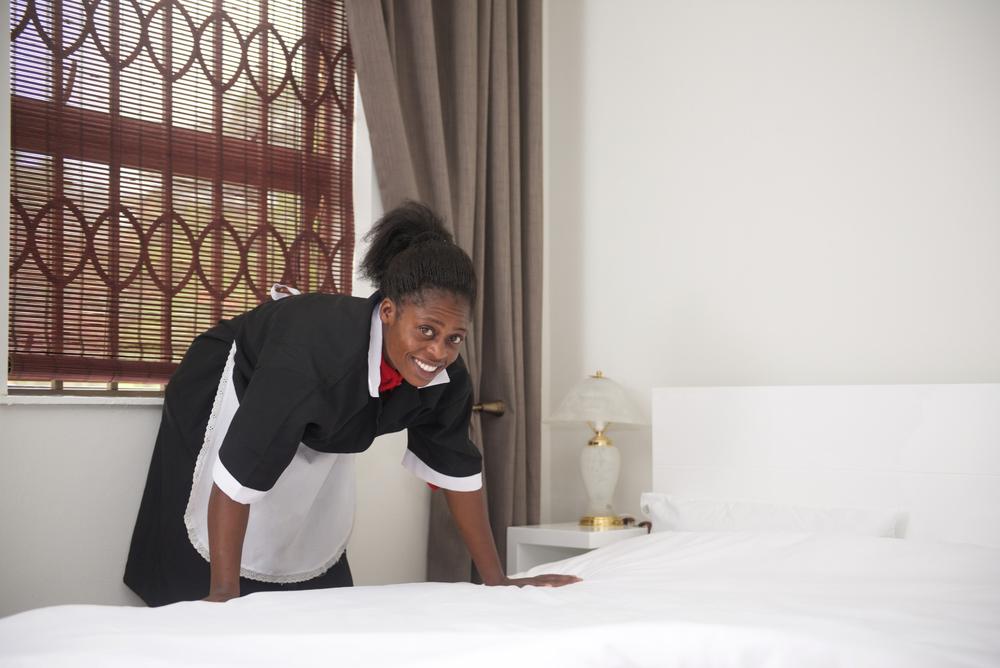Features
Elizabeth Ajetunmobi: Live Out or Live In Domestic Staff? Figuring Out What Works For You
What is the distance between where you live and where the staff lives? Is it reasonably convenient for the person to commute daily? Would the person be able to meet up with the resumption time if they leave their home at a reasonable hour?
How have the past ten months been? What has your experience with your domestic staff been like? If you’ve had more bad days than good, and you’re on the verge of firing your staff, you might want to pause and think deeply about your hiring process before hiring a new one.
Perhaps you’re new to the game and you’re just about to hire your first domestic staff? Then this is the best time to carefully evaluate your unique household needs before you make a choice, because the decision to hire a live-in or a live-out domestic staff is such a big one and should be made carefully.
In a typical household, where both parents work, it can seem like a no-brainer to hire a live-in staff who can be 90% (if not totally) responsible for the kids. While this may seem logical in the interim, it is important to understand your unique situation and household needs before you decide to bring someone to live in your home. Due to bad experiences in the past, some people would rather work with a live-out; however, what they actually need is a live-in domestic staff.
Please note that this piece is not to persuade you either way, rather it is to get you thinking more critically. This will help you to make an informed decision when hiring a domestic staff. Now, let’s take a look at both options individually:
A live out is a staff who resumes at your residence and closes at a particular time. Just the way it is with any other employment, he or she comes in, executes the task for the day within the specified hours during and closes at a fixed time. While this option seems to be gaining popularity among many families today, here are some things to consider before you join this train.
- Proximity: What is the distance between where you live and where the staff lives? Is it reasonably convenient for the person to commute daily? Would the person be able to meet up with the resumption time if they leave their home at a reasonable hour?
- Salary scale: The salary scale for a live-out staff is usually a bit higher than that of a live-in, because it has to accommodate for the cost of the staff’s transportation, rent, and other basic needs. Can you conveniently afford to pay a reasonable salary to your domestic staff over a long period or is it an expense you wouldn’t be willing or able to sustain?
- Working hours: What time do you head out of the house and what time do you return home from work? Is your typical day scheduled in such a way that you can reasonably accommodate your staff? For instance, if you leave for work at 4:00am and you return at 10:00pm, would it be reasonable to expect your staff to wait for you to return before he/she close from work and starts heading home?
- The maturity and physical capability of the home residents: Do you have young children who are unable to help out around the house, children with special needs who require round the clock care, or elderly parents who can’t move about easily? Then maybe a live-in staff might work for you. However, if your kids are old enough to do things for themselves and no longer need full time supervision and care, and if the amount of work to be done is something that can be done within a few hours or a few days per week, then maybe what you need is a live-out staff who doesn’t need to be in your home round the clock.
Live-in staff have been the norm for the longest time. A lot of families opt for this option when hiring because it’s what they’ve seen others do. In a lot of cases a live-in staff just seems to be the most convenient option to make life easier for the employer, because of the 24-hour access to the staff. However, if there is a hiring error, a live-in staff can prove to be more stress than support for the employer. So, before you hire a live-in staff here are somethings to consider:
- Room and board: Are you willing and able to provide decent housing and feeding conditions for your domestic staff? We hear stories of employers who hire live-in staff and ask them to pay certain bills or ask them to provide for their own feeding. It isn’t wrong to ask the staff to provide certain things for themselves. However, this should be done with discretion and the outcome should be mutually beneficial to both parties.
- Privacy: If you’re going to have your staff live in your home, it is important that you set clear boundaries from the onset. Let them know what they have access to, what they need to ask permission to use, and what is completely off limits to them. You might also want to set your boundaries by buying them their own cutlery, toiletries and provisions and keeping them separately from your own items.
- Job roles: What job duties are you really hiring for? Be clear about the job duties to be performed by the staff and ensure the salary scale is fair. For example, would the staff be a cook? A housekeeper? A nanny? All of the above, or some of the above? It’s very easy for employers to assume that since the staff lives in your house, they should automatically do everything. But that should never be assumed. To avoid conflict, all tasks should be clearly discussed and agreed upon.
- Trust: Would you be able to trust your staff? A live-in staff would have access to a lot of things in your home. It is important that you hire someone who shares similar values with your family, maybe a similar belief system, and someone you can build a civil relationship with.
- Tolerance: Can you tolerate the excesses of another adult? Before you employ a live-in staff, you need to understand that domestic staff are adults with a mind of their own and they have human tendencies, like wanting their own space, freedom to visit friends, fix their hair, relax, etc. For some, it might be easy to simply follow your house rules, but majority might struggle from time to time to bend to your rules. Are you willing to patiently put up with them in cases where they exhibit traits you don’t particularly like? Or would you rather not deal with any of that?
As you can see neither option is absolutely better than the other. They both have their advantages and disadvantages. Now that you know what to consider in hiring a staff, which option do you think suits your unique household needs? Whichever option you decide on, I advise that you do your checks and verifications thoroughly, and always work with an agency if you can. I wish you the best in your hiring process!






















